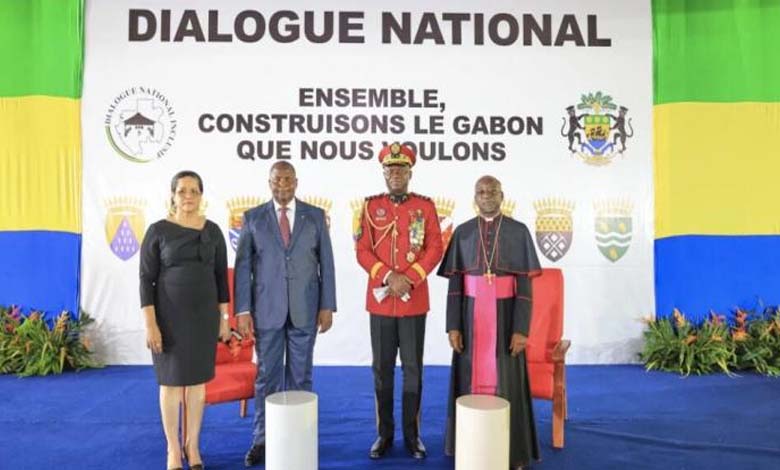Draft of New Gabon Constitution: Everything You Need to Know

Drafting a new constitution in Gabon is no easy task, as the text demands a lot of detail, clarification, and correction in a country that is redefining its political landscape.
The draft constitution has not yet been revealed, but leaks have highlighted the main points of the document, which the Gabonese hope will include comprehensive reforms and address the flaws of previous texts.
The Gabonese constitution was adopted in 1991, has been amended several times, and has faced long-term criticism. Therefore, it will be completely revised, a reform praised by participants in the comprehensive national dialogue held last April.
On May 8, the ruling military council appointed a 21-member national constitutional committee responsible for drafting a new text.
Behind the Scenes
The draft of the new constitution comprises 150 articles divided among dozens of titles. According to one of its drafters, the future constitution of Gabon “will be the most democratic in the country’s history because it is directly derived from the Gabonese people themselves.”
After the constitutional committee was appointed by the “Committee for the Transition and Restoration of Institutions,” it took about five weeks to produce the final version, which was completed on May 13.
The committee included 21 members from academia, politics, religion, law, and civil society, who worked “in a spirit of consensus, making decisions based on compromise.”
According to statements from some of its members to the French media, the task “was not easy; we first had to receive some education, especially since some members are not specialists in constitutional law at all.”
They pointed out that “some misunderstood our mission, so we formed a group of seven people, academics, and judges, to write the first draft. It was then discussed during plenary sessions, each article was analyzed, and some amendments were made.”
They added, “But we had to explain a lot, as some were thinking with the old system in mind, while we are in the midst of a profound reform.”
Certain elements allowed for opening discussions, particularly as some judges on the committee were former students or at least close to the academic community.
Some politicians also shared their practical experiences, allowing many articles to be softened and better adapted to reality.
Overall, the writing did not start from scratch, as the project considered the outcomes of the comprehensive national dialogue, even if they were “vague and general.”
“It was necessary to detail, clarify, strengthen, and correct contradictions, but also to consider Gabon‘s constitutional heritage, so we took useful provisions from the old text,” according to one member.
The committee also conducted comparative law by relying on legal sources outside Gabon, such as the fundamental texts of other countries.
Thus, the constitutions of France, the United States, Germany, Spain, Belgium, Ivory Coast, Benin, and even Senegal and South Africa were used to enrich the thinking.
The work also drew on the precedents of the former Constitutional Court, which certainly faced much criticism but “was not all bad.”
The provisions of the transitional charter, African international treaties, or the United Nations Charter also served as sources.
Presidential System with Guarantees
Ultimately, the draft constitution provides for a presidential system, but with guarantees to avoid excessive dominance by the head of state.
According to a member of the national constitutional committee, there is “a strong emphasis on maintaining the balance and separation of powers,” with the president’s term being seven years, renewable once.
The president must be Gabonese by birth from both parents, without dual nationality, and will be both head of state and government, meaning there will be no prime minister.
The first guarantee is that the president will be accountable to the parliament and, therefore, to the people, meaning there will be impeachment procedures in cases such as high treason or violation of the oath or constitution.
High treason will particularly include crimes of corruption, intelligence with terrorist forces, embezzlement of public funds, and so on.
To ratify impeachment, at least two-thirds of the parliament must vote in favor, and the mechanism can also target ministers, heads of high courts, and judges of the constitutional court.
Another guarantee includes an “anti-tampering” system: some articles of the constitution will be “practically inviolable,” particularly those concerning the term and number of presidential mandates.
This principle is reinforced by a second protection via an article stating that its predecessor cannot be violated. The only way to amend these articles is by changing the constitution, which will only be possible through a referendum.
Therefore, for simple matters, the text can be amended using parliamentary tools, including adapting it to international agreements, except when it concerns issues of national sovereignty.
Specific procedures were allocated for sending troops abroad, decided by the head of state who must inform the heads of both houses. On the other hand, the parliament must approve the continued presence of troops outside Gabon.
A Strong Parliament
Regarding the legislative power, the National Assembly and the Senate will be maintained, with both houses elected for a five-year term, renewable this time.
This principle was adopted to avoid doubling the number of former elected officials and thus overburdening the pension funds.
To balance presidential power, the committee members wanted to maintain a strong parliament with the power to impeach. They also added mechanisms, notably to question the head of state on specific points, after which the president or one of his representatives must come and explain his position to the elected officials.
The parliament will also have investigative powers, with the ability to appoint inquiry or oversight committees and transfer these powers to the courts when high-ranking officials are involved.
Furthermore, the principle of incompatibility between ministerial and parliamentary duties, previously found in the recommendations of the comprehensive national dialogue, was maintained. If a member of parliament agrees to join the government, they automatically lose their mandate, and their substitute takes their place in the council.
Therefore, accepting a ministerial position will involve risks, as the government’s term remains uncertain by nature. The highest text aims to encourage the expansion of ministerial profiles, particularly for members of civil society, executives, and so on.












